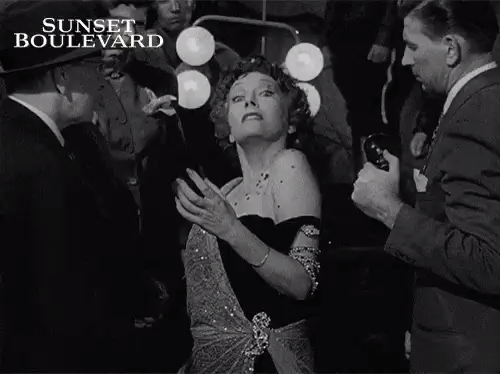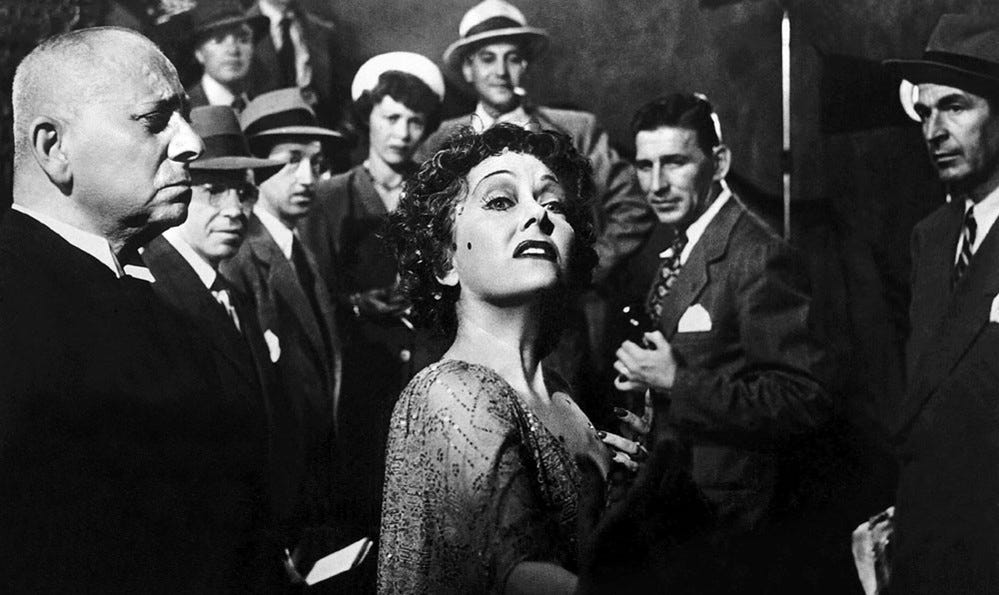Dear Reader,
Sunset Blvd. is one of my all-time favorite movies. The plot involves a down-on-his-luck screenwriter who, by chance, pulls into the sprawling but run-down estate of a wealthy has-been silent film star. I alluded to it a few weeks ago:


By some miracle, I convinced my 14-year-old to watch it with me. He will stay up all night bingeing Grey’s Anatomy or The Walking Dead, but has a tolerance for old black-and-white films that approaches zero. But he was into it. At the end, he said: “I liked that. It was much better than I was expecting.” That may have been my greatest parenting triumph of quarantine, narrowly edging out the time I coerced my 16-year-old into hate-reading The Sun Also Rises.
The more I think about Sunset Blvd. in light of Impeachment Redux that begins this week, the more relevant it feels.
Spoiler alert! I’m going to reveal some things about this 71-year-old film, so if you want to watch it fresh, stop reading right now.
The film is narrated by the failed screenwriter, Joe Gillis (William Holden). He is desperate for an infusion of money. Without $200, he’ll be done in Hollywood. He strikes out with his agent, the studio head he knows, his friends. Running from the repo men, he pulls into the driveway of an old manse on Sunset, in the 10,000 block—and there meets an actress who was once, before “talkies,” the biggest star of them all.
—Hey. I know you. You’re Norma Desmond! You used to be in silent pictures. You used to be big!
—I am big. It’s the pictures that got small!
He winds up staying there to help revise the terrible, overwrought screenplay she’s produced. Max, her creepy butler and servant, provides for his every need, as he does with Norma. He writes the script. And, creepily, he becomes her lover. He lets her buy him new clothes, a nice watch, cuff-links. He’s a kept man, basically—he has so much, and yet it is all conditioned on maintaining this toxic relationship with an actress who is stuck in the past. She’s overdramatic, narcissistic, desperate, and delusional. She clings to the belief that she is still the greatest of them all, that there are millions of fans who really do miss her.
A former silent film star in real life, Gloria Swanson was 50 when she made Sunset Blvd. Before that, she had not worked in 20 years. Her performance is sensationally over the top, which perhaps explains why Norma Desmond is, still, a popular drag character. Erich von Stroheim turns in a wonderfully understated performance as her dutiful cuckolded servant. A bunch of old actors play themselves, giving the film a “meta” feel. Cecil B. DeMille, the great director, is wonderfully human in his small but crucial role.
At the climax, Joe leaves Norma. Before he goes, he begs Max to tell her the truth, that she really is a has-been, and that that’s okay. But she can’t reconcile this, so she shoots him. He falls dead into her swimming pool. As the police arrive, she goes into a fugue state, which she only snaps out of when the news cameras arrive. She confuses them with movie cameras. Max perpetuates the illusion, acting as director. The film ends with the image I put in the tweet, Norma making love to the camera one last time. “All right,” she says, famously, “Mr. DeMille. I’m ready for my close-up.”
To apply this to the here and now: Joe Gillis is the entire Republican Party. He knows better than to stay with this insane person, but knows also that if he leaves, his career is over. So he plays the game, going so far as to take her to bed. And once he consummates the relationship, it’s not so easy to extricate himself. Max is the inner circle of enablers who tell Trump what he wants to hear: Rudy Giuliani, Sidney Powell, Mike Flynn, Roger Stone, and so on. Max never breaks character, not once. Even when the police come, he does not relent. And Norma Desmond is Trump himself, divorced from reality, desperate for attention, psychologically broken, petty, self-centered, vindictive—and willing to use violence to achieve his ends. In this analogy, Trump shoots and kills the Republican Party, his enablers double down even as law enforcement arrive, and Trump himself cares only about being in front of those cameras one last time.
Consider this, my friends: An attention whore, accustomed these last five years to unlimited media exposure, finds himself abruptly cut off from social media. He’s suddenly in the dark, writing tweets that will never be sent on cocktail napkins. He’s an addict with no more smack left. After two months of this torment, will he be able to resist the temptation to go in front of the cameras one last time—at his impeachment trial, which millions if not billions of people would watch—even if he knows, deep down, it will destroy him?
“No one leaves a star,” Norma says. “That’s what makes one a star.”





I just wanna say, Greg, I think you’re an incredibly talented writer. Truly.
I’ve never seen the movie, but I simply adore old black n whites, so def putting this one in my watch list now. Thank you for the inspiration!
Okay ~ so what is this feeling that you get while watching trump, and watching this movie, and watching a train wreck... because it's been stirring in my gut for the past 5 years, and thank god for Biden, because... Relief.